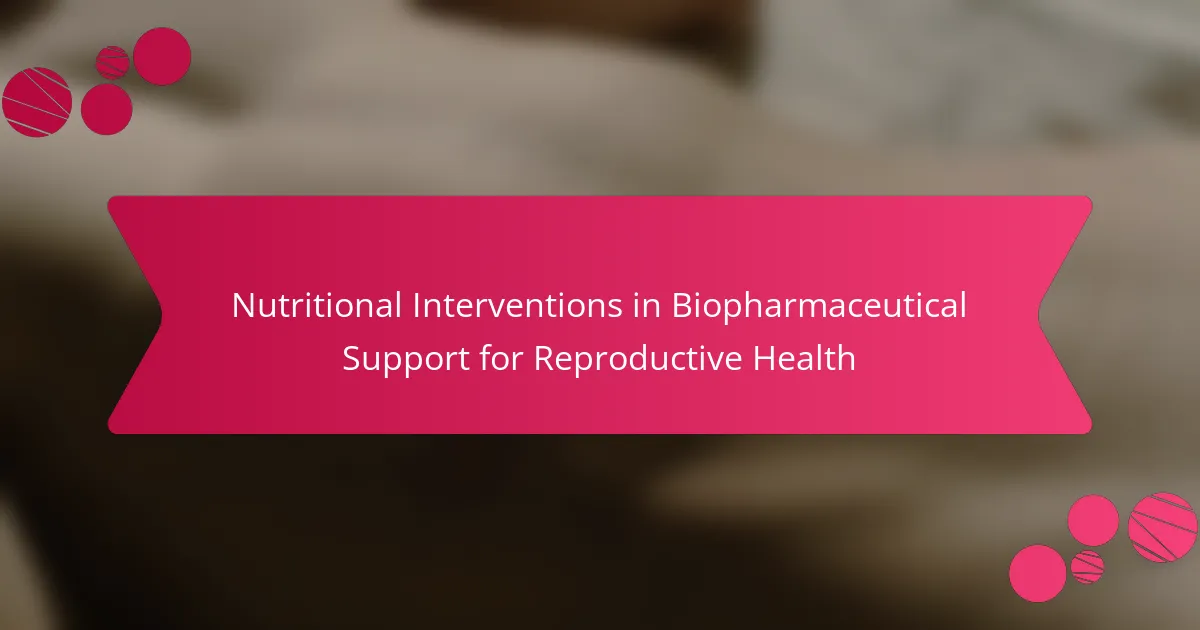Nutritional interventions significantly enhance biopharmaceutical support for reproductive health by optimizing hormone balance and bodily functions. Key nutrients like folate and omega-3 fatty acids improve fertility outcomes and support hormonal therapies. Tailored dietary modifications and lifestyle changes are essential for maximizing the effectiveness of these interventions. Addressing unique dietary needs across diverse populations ensures better reproductive health outcomes.

What role do nutritional interventions play in biopharmaceutical support for reproductive health?
Nutritional interventions significantly enhance biopharmaceutical support for reproductive health by optimizing bodily functions and hormone balance. These interventions can improve fertility outcomes and support overall reproductive health through targeted nutrient intake. For instance, folic acid supplementation is crucial in preventing neural tube defects during pregnancy. Additionally, omega-3 fatty acids contribute to improved ovulatory function and hormone regulation. A balanced diet rich in antioxidants can also mitigate oxidative stress, which negatively impacts reproductive health.
How do specific nutrients influence reproductive functions?
Specific nutrients significantly enhance reproductive functions by supporting hormonal balance, improving egg and sperm quality, and facilitating fetal development. For instance, folate is crucial for DNA synthesis and cell division, while zinc supports testosterone production and sperm health. Omega-3 fatty acids promote healthy ovulation and reduce inflammation. Vitamins A, C, D, and E contribute to overall reproductive health by protecting against oxidative stress and supporting immune function. These nutrients can be obtained through a balanced diet or targeted supplementation, ensuring optimal reproductive outcomes.
What are the mechanisms behind nutrient absorption and metabolism in reproductive health?
Nutrient absorption and metabolism in reproductive health involve complex biochemical processes. These mechanisms include the digestion of nutrients, their transport across cell membranes, and their utilization in reproductive tissues.
Key nutrients such as vitamins, minerals, and fatty acids play crucial roles in hormone production and reproductive function. For instance, folate is essential for DNA synthesis and cell division, impacting fertility. Additionally, omega-3 fatty acids contribute to hormone regulation and inflammation reduction, supporting reproductive health.
Factors like gut health and microbiome composition significantly influence nutrient absorption. A balanced microbiome enhances the bioavailability of nutrients, while deficiencies can lead to metabolic disorders affecting reproductive health.
Overall, understanding these mechanisms allows for targeted nutritional interventions, optimizing reproductive health outcomes through tailored dietary strategies.

Which biopharmaceuticals are enhanced by nutritional interventions for reproductive health?
Nutritional interventions can enhance several biopharmaceuticals for reproductive health, including hormonal therapies and fertility medications. Key nutrients like folate, omega-3 fatty acids, and antioxidants play crucial roles in optimizing the efficacy of these treatments. For instance, folate supplementation can improve the outcomes of in vitro fertilization (IVF) protocols. Omega-3 fatty acids support hormone production and may enhance reproductive function. Antioxidants help mitigate oxidative stress, improving overall reproductive health. Integrating these nutritional strategies can significantly boost the effectiveness of biopharmaceutical interventions.
How do vitamins and minerals interact with reproductive biopharmaceuticals?
Vitamins and minerals can enhance the efficacy of reproductive biopharmaceuticals by supporting hormonal balance and improving overall reproductive health. For instance, folate plays a critical role in DNA synthesis, while zinc is essential for sperm production. These nutrients may also mitigate side effects associated with certain medications. Additionally, antioxidants like vitamins C and E can protect reproductive cells from oxidative stress, promoting better outcomes in fertility treatments.
What are the implications of nutrient deficiencies on biopharmaceutical efficacy?
Nutrient deficiencies can significantly impair biopharmaceutical efficacy in reproductive health. Insufficient vitamins and minerals may lead to suboptimal drug absorption and metabolism. For instance, deficiencies in folate and zinc can hinder the effectiveness of certain fertility medications. As a result, addressing these deficiencies through nutritional interventions can enhance the therapeutic outcomes of biopharmaceuticals. Proper nutrient levels support hormonal balance and reproductive function, ultimately improving overall health and treatment success.

What are the common nutritional strategies used in conjunction with biopharmaceuticals for reproductive health?
Nutritional strategies often complement biopharmaceuticals in enhancing reproductive health. These strategies include specific dietary modifications, supplementation, and lifestyle changes that optimize hormone balance and overall well-being.
Common nutritional interventions involve increasing intake of antioxidants, omega-3 fatty acids, and vitamins such as folate and vitamin D. Antioxidants, found in fruits and vegetables, protect cells from oxidative stress, which can impact fertility. Omega-3 fatty acids, present in fish and flaxseeds, support hormonal function and reduce inflammation.
Supplementation with specific nutrients can also play a crucial role. For instance, coenzyme Q10 may improve egg quality, while myo-inositol has shown promise in managing polycystic ovary syndrome (PCOS). These supplements work synergistically with biopharmaceuticals, enhancing their effectiveness.
Lifestyle changes, including maintaining a healthy weight and managing stress, are vital. Balanced nutrition combined with regular physical activity can improve metabolic health, which is essential for reproductive function. These strategies create a holistic approach to reproductive health that maximizes the benefits of biopharmaceutical interventions.
Which dietary patterns are most effective for supporting reproductive health?
Diets rich in whole foods, healthy fats, and antioxidants effectively support reproductive health. Mediterranean, plant-based, and traditional Asian diets promote hormonal balance and fertility.
Mediterranean diet emphasizes fruits, vegetables, whole grains, nuts, and healthy fats, enhancing reproductive function. Studies show it improves ovulatory function and reduces infertility risk.
Plant-based diets, rich in legumes, nuts, and seeds, provide essential nutrients like folate and iron. These nutrients support ovulation and overall reproductive health.
Traditional Asian diets focus on balanced meals with rice, vegetables, and fish. They are linked to lower rates of reproductive disorders due to their nutrient density and balance.
How can supplementation optimize the effects of reproductive health medications?
Supplementation can significantly enhance the efficacy of reproductive health medications. Nutritional interventions provide essential vitamins and minerals that support hormonal balance and improve overall reproductive function. For instance, folic acid supplementation can increase fertility and reduce the risk of birth defects. Omega-3 fatty acids may improve egg quality and support embryo development. Additionally, antioxidants like vitamin E can mitigate oxidative stress, promoting a healthier reproductive environment. Integrating these supplements with prescribed medications can optimize treatment outcomes and enhance reproductive health.

What are the unique considerations for diverse populations regarding nutritional interventions in reproductive health?
Diverse populations require tailored nutritional interventions in reproductive health to address unique dietary needs and cultural practices. Cultural beliefs significantly influence food choices, impacting nutrient intake. For instance, some groups may have traditional diets low in essential vitamins, necessitating targeted supplementation. Additionally, socioeconomic factors can limit access to nutritious foods, making education on affordable options crucial. Understanding these unique attributes ensures effective biopharmaceutical support and enhances reproductive health outcomes across different communities.
How do cultural dietary practices influence reproductive health outcomes?
Cultural dietary practices significantly influence reproductive health outcomes through nutritional interventions. Traditional diets often provide essential nutrients that support hormonal balance and fertility. For instance, diets rich in omega-3 fatty acids and antioxidants can enhance reproductive function. Additionally, cultural beliefs may dictate food choices, impacting overall health and fertility rates. Studies show that populations adhering to specific dietary customs tend to experience different reproductive health outcomes, emphasizing the importance of integrating cultural considerations into nutritional support for reproductive health.
What are the specific nutritional needs for different age groups in reproductive health?
Different age groups have specific nutritional needs that support reproductive health. Adolescents require higher iron and calcium for growth and development. Adults benefit from folate and omega-3 fatty acids to support fertility and hormonal balance. Older adults need vitamin D and antioxidants to maintain reproductive health and manage age-related changes. Proper nutrition tailored to these stages can enhance reproductive outcomes.

What challenges exist in integrating nutritional interventions with biopharmaceuticals for reproductive health?
Integrating nutritional interventions with biopharmaceuticals for reproductive health faces multiple challenges. These include the complexity of individual dietary needs, variability in nutrient absorption, and potential interactions between drugs and nutrients.
Additionally, insufficient clinical research limits understanding of optimal combinations. Regulatory hurdles can impede the approval of combined therapies. Lastly, patient adherence to nutritional recommendations may vary, impacting overall effectiveness.
How can healthcare providers overcome barriers to effective nutritional counseling?
Healthcare providers can overcome barriers to effective nutritional counseling by enhancing communication, education, and collaboration. Improving provider training on nutritional interventions increases confidence in delivering advice. Establishing a multidisciplinary approach fosters teamwork among healthcare professionals, ensuring comprehensive support for reproductive health. Utilizing technology, such as telehealth, expands access to counseling and resources. Engaging patients through personalized plans promotes adherence and encourages a proactive approach to nutrition.
What common misconceptions hinder the acceptance of nutritional interventions?
Common misconceptions about nutritional interventions include the belief that they are unnecessary, overly complicated, or not scientifically backed. These views can lead to resistance against integrating nutritional strategies into biopharmaceutical support for reproductive health. For instance, some individuals may think that medications alone suffice for reproductive health, neglecting the synergistic benefits of nutrition. Additionally, misinformation about the efficacy and safety of specific dietary changes can create skepticism. As a result, these misconceptions hinder patient engagement and adherence to comprehensive health plans.

What are the best practices for implementing nutritional interventions in clinical settings for reproductive health?
Nutritional interventions in clinical settings for reproductive health should prioritize individualized assessments and evidence-based strategies. Implementing these interventions involves collaboration among healthcare providers, nutritionists, and patients to ensure tailored approaches.
1. Conduct thorough nutritional assessments to identify specific needs and deficiencies.
2. Develop personalized nutrition plans based on individual health profiles and reproductive goals.
3. Monitor and adjust interventions regularly to optimize outcomes and address changing needs.
4. Educate patients on the importance of nutrition for reproductive health, including the role of specific nutrients.
5. Foster a supportive environment that encourages adherence to nutritional recommendations.
6. Utilize technology, such as apps or telehealth, to enhance communication and follow-up.
How can practitioners assess nutritional needs effectively?
Practitioners can assess nutritional needs effectively by utilizing comprehensive evaluations and tailored interventions. This involves gathering detailed patient histories, conducting dietary assessments, and analyzing biochemical markers.
Integrating evidence-based guidelines ensures that nutritional interventions align with reproductive health goals. For example, assessing micronutrient levels can reveal specific deficiencies impacting fertility.
Regular monitoring of dietary intake and lifestyle factors enhances the ability to adjust interventions as needed. Collaboration with multidisciplinary teams further enriches the assessment process, ensuring a holistic approach to reproductive health.
Utilizing technology, such as dietary tracking apps, can streamline data collection and improve patient engagement in their nutritional care.
What are the key strategies for patient education on nutritional interventions?
Key strategies for patient education on nutritional interventions include personalized dietary plans, clear communication of benefits, interactive workshops, and ongoing support. These approaches enhance understanding and adherence to nutritional guidelines, ultimately improving reproductive health outcomes. Engaging patients through tailored resources fosters a deeper connection to their health journey.
What common mistakes should be avoided when recommending nutritional interventions?
When recommending nutritional interventions for reproductive health, avoid common mistakes such as oversimplifying dietary needs, neglecting individual variability, and overlooking evidence-based guidelines. Each individual’s nutritional requirements can differ based on unique attributes like age, health status, and lifestyle. Ignoring these factors can lead to ineffective or harmful recommendations. Additionally, relying solely on anecdotal evidence rather than scientific research can compromise the quality of interventions. Prioritize a comprehensive understanding of nutritional science to tailor interventions effectively.
